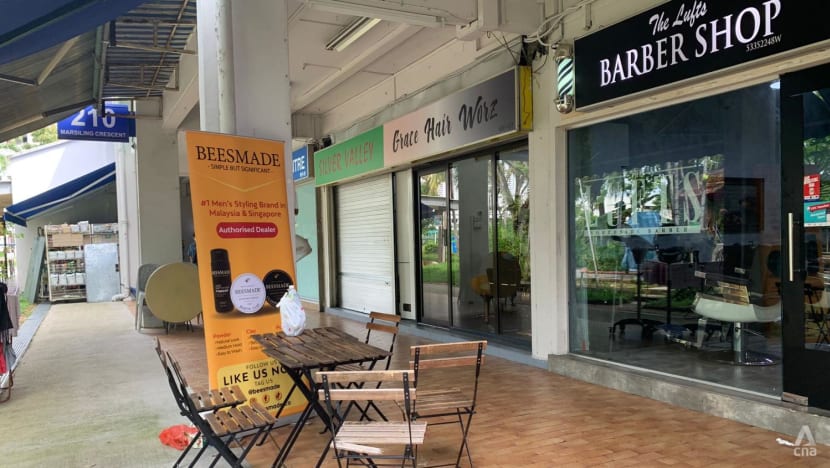HDB may step in to acquire privately owned shops amid soaring rents in heartlands
Rental rates for privately owned HDB shop units were reported to have more than doubled over the past year.


This audio is generated by an AI tool.
SINGAPORE: The Housing Development Board (HDB) will selectively acquire privately owned HDB shops if needed and increase the overall supply of commercial units that it leases out, Senior Minister of State for National Development Sun Xueling said in parliament on Wednesday (Sep 24).
With the increase in supply of HDB shops, a higher proportion will be shops that are directly rented out by HDB, of which rents have been keeping stable in recent years.
Ms Sun was responding to several parliamentary questions about the cost of renting HDB commercial units, following reports of rising rents in heartland areas.
There are around 15,500 HDB shops in Singapore, said Ms Sun. Of these, about 8,500 are privately owned, and about 7,000 are rented out by HDB.
“We are aware that per square foot rents for privately owned HDB shops have seen a steep increase recently,” she said.
Rental rates for privately held HDB shop units have more than doubled over the past year, while rents for shops leased by HDB have remained mostly stable, reported the Straits Times in early September.
In her response, the senior minister of state said the increase in rent coincided with a higher proportion of rental transactions involving smaller-sized units, which tend to command higher per square foot rents.
There are around 740 privately owned HDB shops sold on 30-year leases, more than 80 per cent of which have less than 10 years of lease remaining.
“These shops will progressively be returned to HDB and then tenanted out,” she said.
Apart from these shops, Ms Sun said there were another 7,700 privately held HDB shops that were sold on 99-year leases and still have more than 30 years of lease remaining.
Since 1998, HDB has ceased the sale of HDB shops to private owners, and now rents them out to businesses directly.
Going forward, Ms Sun said HDB will increase the overall supply of HDB shops, with a higher proportion directly rented out by the government.
“We will also inject new retail supply to meet demand in existing estates when necessary, including the option of selectively acquiring privately held HDB shops if needed,” said Ms Sun.
Mr Henry Kwek (PAP-Kebun Baru) then asked a question about whether the ministry will prioritise such interventions in selected trades like cooked food stalls, adding that increased rental costs for these businesses lead to higher cost-of-living implications.
In response, Ms Sun said the government will have to “allow market forces to play out”.
“There are demand and supply considerations. Landlords make their business decisions, tenants make their business decisions,” she said.
However, she added that the authorities will “take a more critical look” at essential services, especially in food and medical sectors. When the supply is considered “less than what would be optimal”, HDB will look into selectively acquiring shops, she said.
On this, Mr Ang Wei Neng (PAP-West Coast-Jurong West) asked what circumstances the HDB would consider when acquiring privately owned shops.
Owners of privately owned shops often "lease them out to the highest possible rent", said Mr Ang, adding that this could lead to an "undesirable business mix in the neighbourhood", such as spas or licensed moneylender shops.
Responding, Ms Sun said that if the HDB were to directly acquire privately owned shops that are transacted at high prices, it would not be a "good use of taxpayers' money".
One possibility is to selectively acquire shops around the shop in question that is charging a high rent, she added.
"That is something that we can consider. But we have to look at the overall supply of shops in the market and what are the products and services that they are offering," she said.
STABLE RENTS FOR SHOPS DIRECTLY RENTED OUT BY HDB
For shops that are rented out by HDB, there are “various measures in place” to keep rents stable, she said.
All shops are typically rented out by HDB for three years. When an existing tenancy is due for renewal, the rent for the next tenancy period will be assessed by professional valuers appointed by HDB.
HDB will take into account recent rents of similar premises in the vicinity and consider prevailing market conditions.
Ms Sun said that under this approach, rents in 90 per cent of rented HDB shops have not seen an increase in rents in the last five years. Over the last three years, average rents increased at a “moderate pace” of between 1.3 per cent and 3.3 per cent per year, she added.
Listen:
RENTAL OF MEDICAL FACILITIES
On the rents for HDB shops that are tendered out for medical facilities, Ms Sun said that the average rent per square foot was S$10.40 (US$8.10) in 2020.
This amount rose to S$22.70 last year and S$28.50 in the first half of 2025.
Until recently, HDB leased most shop units for GP clinics based purely on price, Ms Sun said.
In June, CNA reported that a general practitioner (GP) company bid over S$52,000 for an HDB shop in Tampines.
Since May, HDB and the Ministry of Health have been piloting the use of the price-quality method in tenders for GP clinics. The first tender under the framework was awarded to a GP clinic in Bartley Beacon at S$16.70 per square foot, Ms Sun said.
This was lower than the average awarded bid of S$35.50 per square foot for designated GP clinic tenders in new housing projects awarded in the last three years.
As for the rental of sublet units, Ms Sun said that HDB does not collect the data, as they are part of the contractual agreement between the tenants and their sub-tenants.
“We understand the concerns that sublet rents could increase more significantly than what HDB charges the main tenant,” Ms Sun said.
She added that HDB will monitor the situation and “explore appropriate ways” to provide more information.
Leader of the Opposition Pritam Singh then suggested that instead of just monitoring it, HDB could take a "further step forward" and publish information about the rents of sublet units.
This would provide a "good indication" of the cost pressures affecting Singaporeans on the ground, he said.
Responding, Ms Sun said that while the HDB maintains an "open stance" and promotes greater transparency of certain data, they must also be cautious not to "overstep” as market forces are in play.
"We have to let business owners, whether or not it's the landlord or the sublet tenant, make their decisions based on what they deem is relevant and suitable for their business considerations," she said.
















